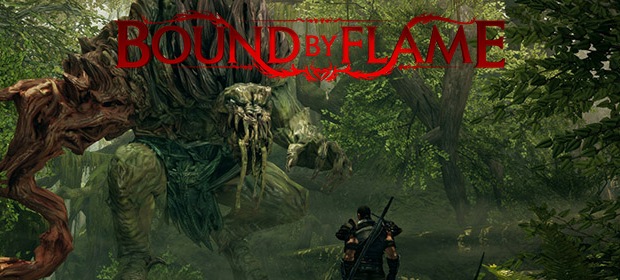Spiders are a studio with potential. Every game they develop brings with it something new, whether that’s the unconventional storytelling in their under-appreciated action-RPG Of Orcs and Men, or the interesting party and crafting mechanics in the less-than-stellar Mars War Logs. Where Spiders really struggle is in bringing all the elements of their games together into a cohesive whole. A great crafting system is no use if the combat is janky; a decent premise is useless if the characters are insipid. What the French outfit really needs is that one great game that slams them down on the map and shows the world what they can do. Bound by Flame comes close to being that game, but for every successful idea, there’s a misfiring mechanic waiting to drop a bag of nuts and bolts into its gears.
Alarm bells begin to chime almost immediately as we’re introduced to the horribly generic plot by way of a narrated cut-scene. The story and setting borrow heavily from The Witcher, Dragon Age, and A Song of Ice and Fire. An army of Deadwalkers are sweeping the nation, led by a group of Ice Lords intent on enslaving the races of man and elf. Your protagonist, nicknamed Vulcan no matter the name you pick for him or her, is a “powder-master” in the employ of a company of elite mercenaries called the Freeborn Blades. While repelling a Deadwalker onslaught, Vulcan is caught up in the fallout of a magical rite performed by the Red Scribes, a sect of shadowy monks whose gold is footing the Freeborn Blades’ current contract. As a result, Vulcan finds himself sharing his body with a demonic presence that imbues him with the power to summon and manipulate fire. With his new found power, Vulcan soon finds himself (or herself) embroiled in a greater conflict, attracting the undesirable attention of the Ice Lords and their undead minions.
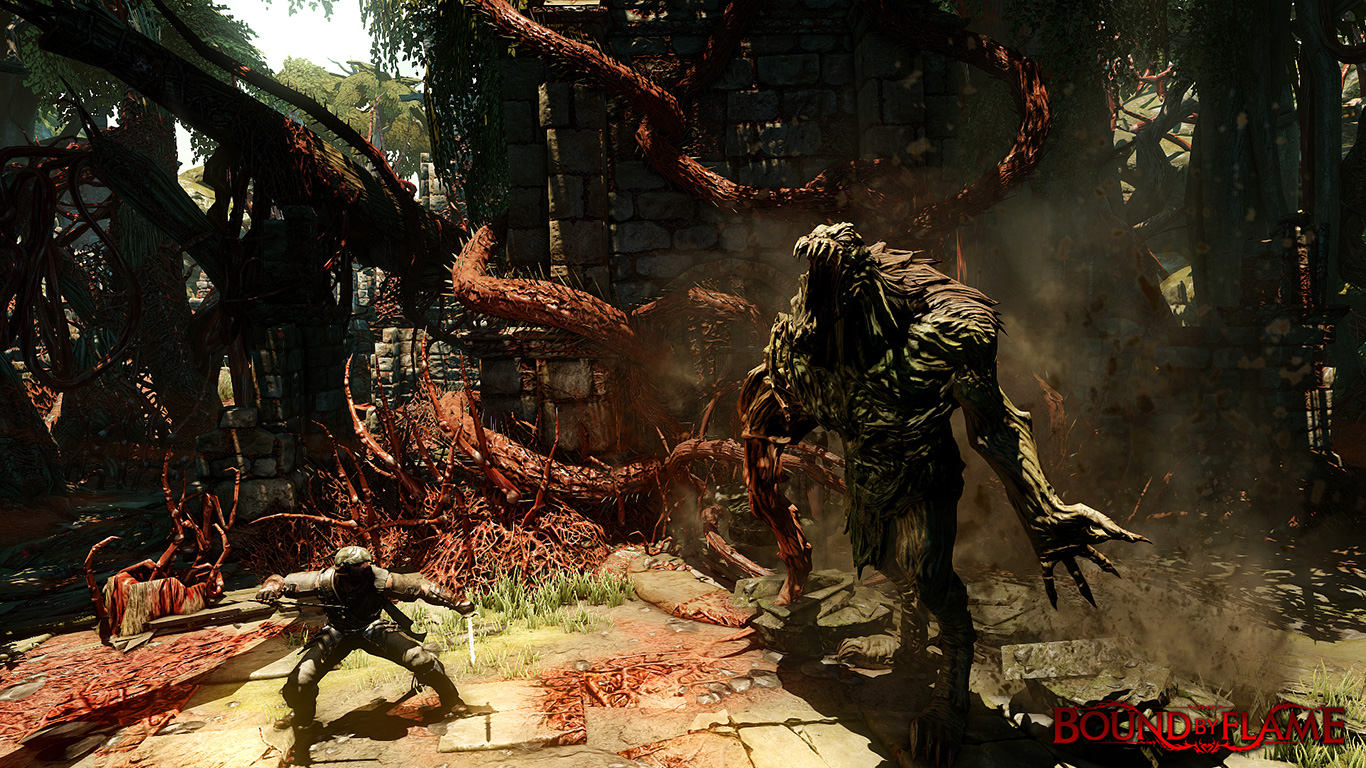
If it sounds trite, that’s because it is. Sadly, Bound by Flame offers absolutely nothing we haven’t seen before in terms of narrative. The fantasy setting is as derivative as they come, and the mishmash of accents (American, Scottish, Eastern European, provincial English) doesn’t help the average voice-acting, and nor does the anachronistic slang and gratuitous swearing, which clash with all the narrying and forsoothing going on in the periphery. Similarily to Of Orcs and Men, Bound by Flame seems to be struggling to find its own identity, unsure whether it wants to be high fantasy, or action-packed, throwaway entertainment. It comes up somewhere in between, falling short of truly achieving either.
Claims that the story would last thirty hours are simply untrue. Without rushing (though without chasing down every side-quest), I was done in ten hours and five minutes. Just as the story was beginning to reach its stride, it ended abruptly and unsatisfyingly, and left me wondering if I had done something to accidentally bypass a massive chunk of it. It is, thankfully, immediately re-playable due to the morality weaved through the narrative. While the choices Vulcan has to make are fairly black and white, the upshot is that making evil decisions (usually any time you take the advice offered by your demonic parasite) mutates the protagonist, eventually quite extremely.
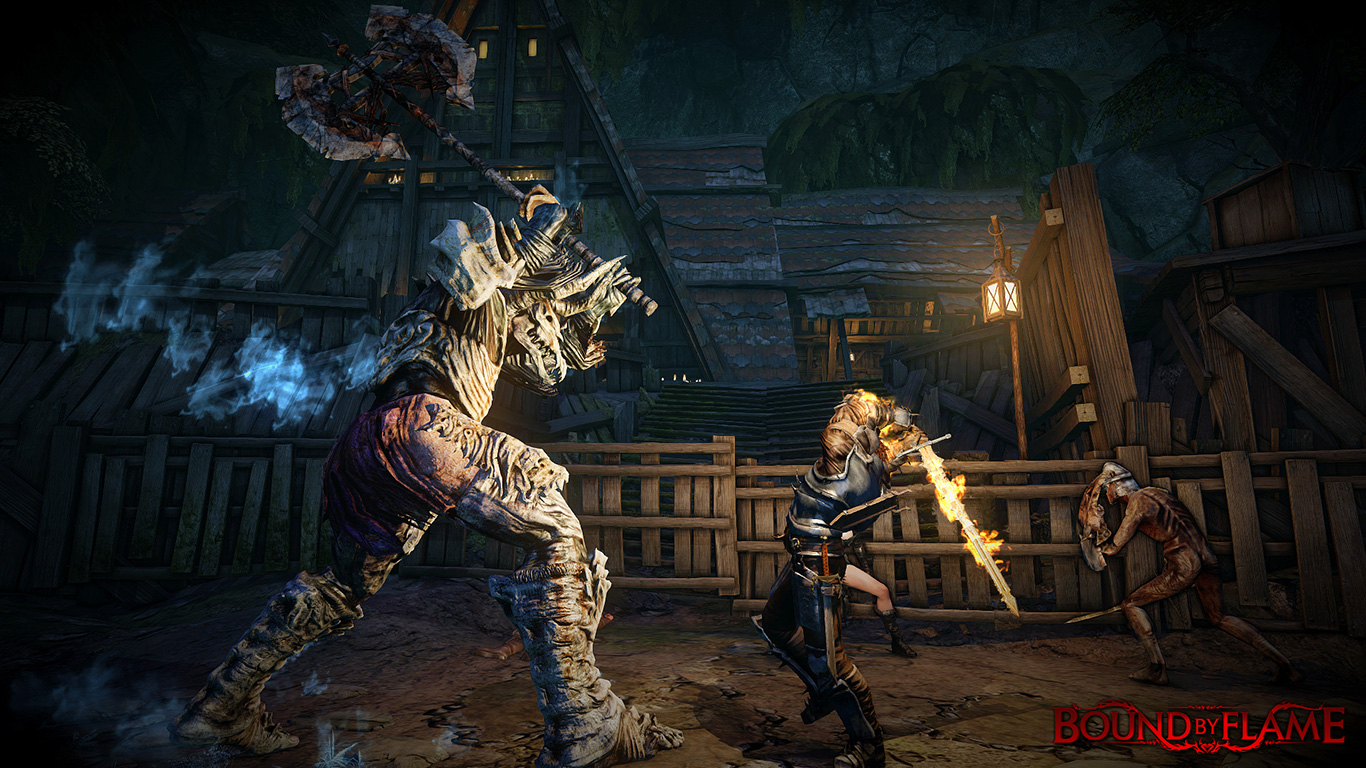
The problem is that there’s little sense of impact in your decisions, even at the finale. No matter what you choose, the ending is over in a few minutes and you’re left wondering what the hell you bothered for. It’s not helped by the fact that the supporting cast of companions carry absolutely no emotional weight. You meet and recruit each one with almost zero pomp and circumstance within the first five or six hours, drafting them into your story like a wet pebble collecting sand. When, quite suddenly, you’re forced to side with one of them and the loser abandons you, it feels completely arbitrary. Dragon Age: Origins, this ain’t, even with “saucy” romance scenes that have all the erotic appeal of an episode of the Thunderbirds.
With very few game areas to traverse in a playthrough (I visited only four separate areas, including the opening temple and the location of the final boss fight) there is hardly time to explore romantic interests, unless you carry out every sidequest, which, frankly, are easy to bypass when a single decision catalyses the next story advancement unexpectedly. Also, no matter what you do, the story does as it pleases. An early quest asks you to save an elven royal with a specially-brewed concoction, but if you miss the ingredients you need, he wakes up healed and offers the flimsiest explanation for his recovery. It’s lazy, rushed writing at its worst. You’ll find yourself skipping through vast swathes of dialogue, and then discovering shortly after that you missed nothing. Events simply have no emotional fallout.
Combat, while enjoyable, is fairly hit and miss throughout. It’s based around three skill tenets: Warrior, Ranger, and Pyromancy. The first stance is Vulcan brandishing a two-handed weapon, and is all about hitting hard and absorbing damage by blocking. You can kick through an enemy’s shield, deliver powerful roundhouse blows or knock an opponent to the ground. It’s more or less Vulcan’s default stance.
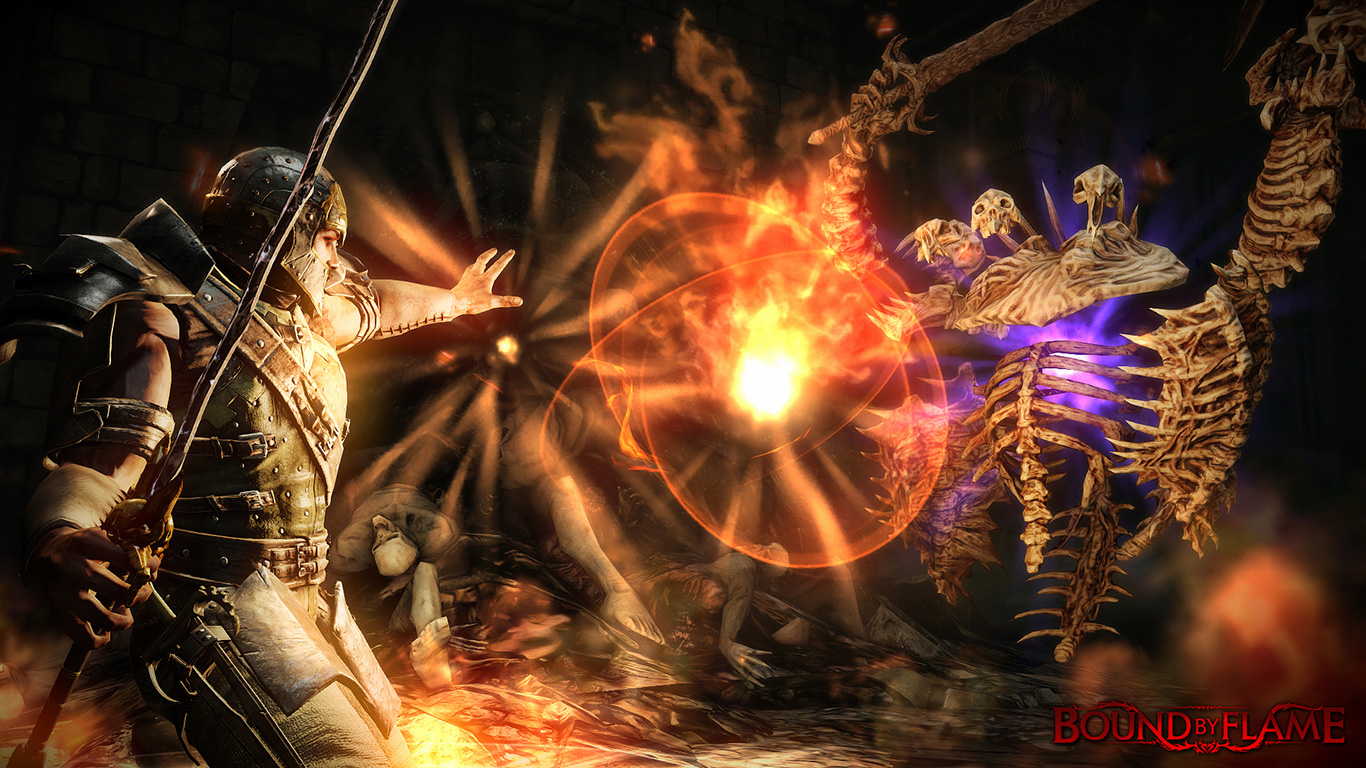
Ranger stance employs twin daggers, and while the damage dealt is more or less on par with Warrior, you attack much faster and aren’t able to block attacks without staggering. In this stance you can enter also stealth mode for high-damage back-attacks. Finally, there’s Pyromancy, which awakens the demon within and launches fireballs or wreathes Vulcan’s weapon in flames. There are only four fire spells available for the whole game, all of which are unlocked from the beginning, and progression only comes from mutating the spells. It remains basic, increasing the number of fireballs or a spell’s duration rather than offering you anything new. In fact, all three skill trees are underwhelming, filled with tri-level talents that do little but increase percentages. An extra ten percent chance to score a critical hit sounds great, but in practice you’ll barely notice a difference from level to level.
Of course, it’s not easy to effectively track your own progression when the difficulty is so ridiculously pendulous. One moment you’ll be carving through the enemy like hot pee through snow; the next you’re forced to face a new type of enemy that seems almost insurmountable. Four times I had to lower the difficulty level to progress, and I was only playing on normal to begin with. The issue is that Vulcan’s attacks lack weight, and enemies can cut straight through your combos. Blocking on time will counter-attack, but it seems that the enemy health bars fall incredibly slowly, each blow knocking a tiny sliver off each time. By contrast, three or four good hits and Vulcan is usually down. When the hyperactive lock-on drags you around the battlefield like you’re on a broken fairground waltzer, you’ll find yourself taking hits from all angles and it’s easy to become overwhelmed. That said, there is a rhythm to the combat that will see you through sooner or later, but constantly blocking and counter-attacking makes every big fight last an age.
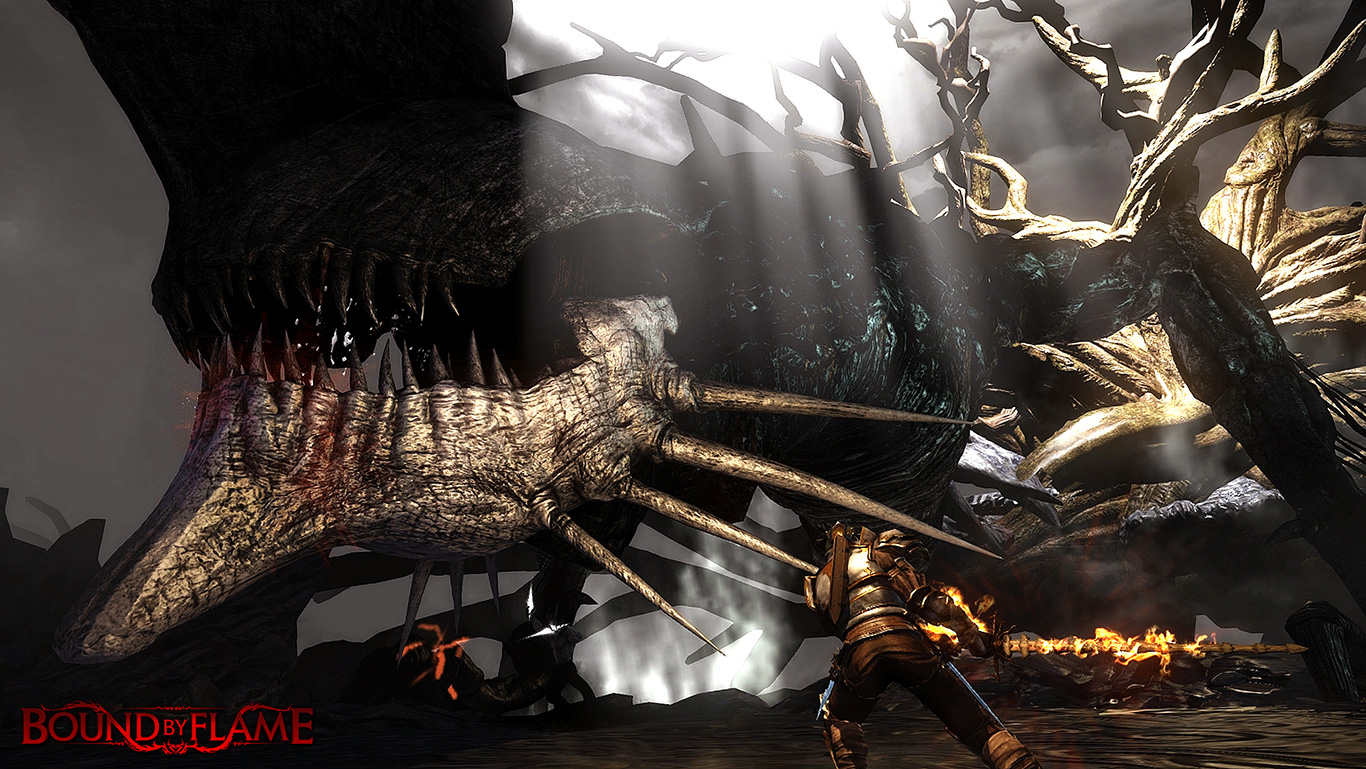
The most interesting element is the under-used crafting system. Bound by Flame allows you to gather ingredients from the environment or the dead, like raw metal, bones and leather, which can then be combined to create rarer ingredients. These can then be applied to most weapons and armour. A breastplate on its own looks fine, but add some shoulder pads and tassets and it starts to look more like a suit of armour. Boots offer kneepads and gloves can be upgraded with elbow pads, while swords and axes can often be adjusted to sport decorative grips, magical jewels and fancy pommels, all of which offer bonuses to attack damage or speed, elemental defence or resource regeneration. You’ll quite often be frustrated when the newest piece of loot you find isn’t as powerful as what you’re already wearing, but the trade-off is often close-run between an upgrade that adds health or one that gives a weapon poison damage. Given the brevity of the narrative, there just aren’t enough armour sets to find, and the whole affair loses its lustre when you realise that the same upgrades are universal across sets, with little option to truly customise anything.
Visually, there’s very little in Bound by Flame to trouble the PS4. Even last-gen consoles will find nothing strenuous in the admittedly atmospheric aesthetics. Lighting and shadows are above average thanks to the decent Silk engine, yet things like character animation and lip-syncing are all over the place.
VERDICT: In Bound by Flame, Spiders deliver an action-RPG that just about manages to remain playable throughout, but offers not a single “wow” moment. An interesting but limited crafting system and an atmospheric fantasy world don’t make up for run-of-the-mill writing, 2-dimensional characters, imbalanced combat, and a rushed, unsatisfying narrative.
Like Of Orcs and Men before it, Bound by Flame is an uneven mishmash of decent new ideas and painfully generic genre tropes that struggle to gel, yet somehow it blunders through to deliver a mostly enjoyable adventure. Bound by Flame had a great deal of potential but it feels half-realised, and this is simply not the epic adventure we were promised.

AVERAGE. The epitome of a 50/50 game, this title will be unspectacular but inoffensive, charmless but amiable. We aren’t condemning a game by scoring it a 5, but we certainly aren’t championing it, either.


